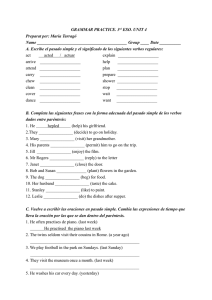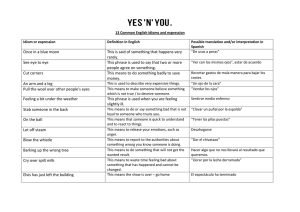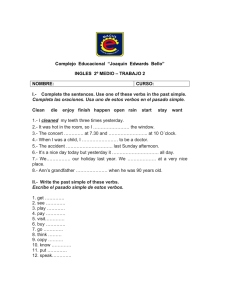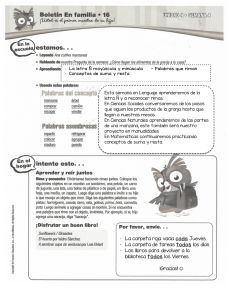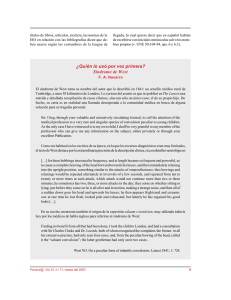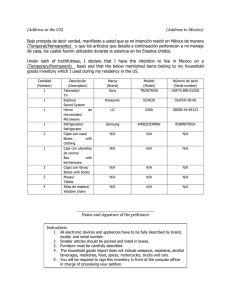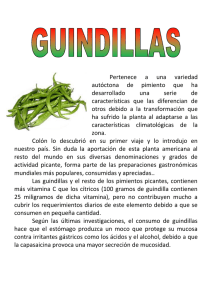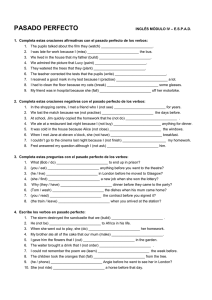Past simple
Anuncio
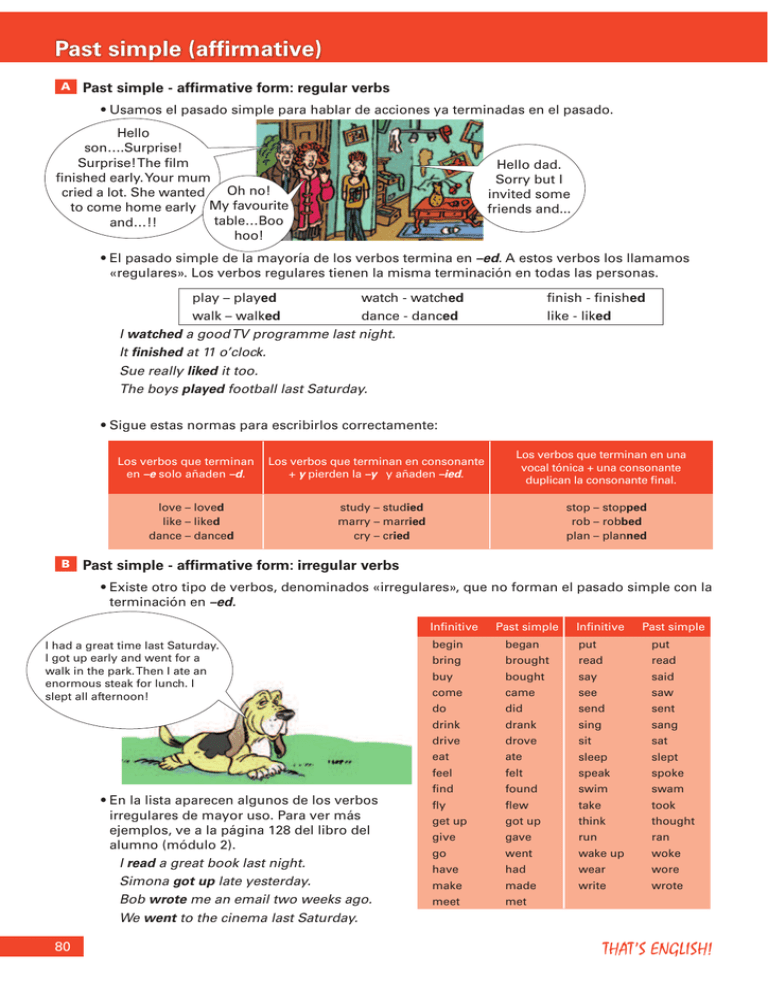
Past simple (affirmative) A Past simple - affirmative form: regular verbs • Usamos el pasado simple para hablar de acciones ya terminadas en el pasado. Hello son….Surprise! Surprise! The film finished early. Your mum Oh no! cried a lot. She wanted to come home early My favourite table…Boo and…!! hoo! Hello dad. Sorry but I invited some friends and... • El pasado simple de la mayoría de los verbos termina en –ed. A estos verbos los llamamos «regulares». Los verbos regulares tienen la misma terminación en todas las personas. play – played watch - watched walk – walked dance - danced I watched a good TV programme last night. It finished at 11 o’clock. Sue really liked it too. The boys played football last Saturday. finish - finished like - liked • Sigue estas normas para escribirlos correctamente: Los verbos que terminan en –e solo añaden –d. love – loved like – liked dance – danced B Los verbos que terminan en consonante + y pierden la –y y añaden –ied. Los verbos que terminan en una vocal tónica + una consonante duplican la consonante final. stop – stopped rob – robbed plan – planned study – studied marry – married cry – cried Past simple - affirmative form: irregular verbs • Existe otro tipo de verbos, denominados «irregulares», que no forman el pasado simple con la terminación en –ed. Infinitive I had a great time last Saturday. I got up early and went for a walk in the park. Then I ate an enormous steak for lunch. I slept all afternoon! • En la lista aparecen algunos de los verbos irregulares de mayor uso. Para ver más ejemplos, ve a la página 128 del libro del alumno (módulo 2). I read a great book last night. Simona got up late yesterday. Bob wrote me an email two weeks ago. We went to the cinema last Saturday. 80 Past simple Infinitive Past simple begin began put put bring brought read read buy bought say said come came see saw do did send sent drink drank sing sang drive drove sit sat eat ate sleep slept feel felt speak spoke find found swim swam fly flew take took get up got up think thought give gave run ran go went wake up woke have had wear wore make made write wrote meet met THAT’S ENGLISH! Exercises 1 Completa las frases con las formas del pasado simple de los verbos regulares que aparecen a continuación. like arrive cry pass stay walk dance die call live study watch introduce Example: Olive walked to work this morning. 1 Petra ............ hard for her exam and she ............ . She was very happy. 2 Michaela ............ in New York last summer. She really ............ it there. 3 Jennifer ............ when her pet dog ............ . 4 Dan ............ with Britney all evening. He ............ her to all his friends. 5 When Jo ............ at the station, she ............ her mother. 6 I ............ at home last night and ............ TV. 2 Rodea con un círculo 12 verbos en la cadena de letras que aparece a continuación. Después escribe su forma en tiempo pasado. 1 ........................... 2 ........................... 3 ........................... 4 ........................... 5 ........................... 6 ........................... 3 7 ........................... 8 ........................... 9 ........................... 10 ......................... 11 ......................... 12 ......................... Escribe frases incluyendo la información que figura entre paréntesis. Example: Tom normally takes the bus to work. (Yesterday / the underground) Yesterday, he took the underground. 1 Miss White usually has lunch at 1 p.m. (Yesterday / 2 p.m.) 2 Gareth normally wears a uniform to work. (Last week / a suit) 3 Judith usually only drinks a small glass of wine. (On Saturday / a lot / at Sam’s party) 4 I don’t normally see Josh very often. (Last week / three times) 5 Jim always takes his dog for a walk in the evening. (Yesterday / in the morning) 6 The Willises always go to Mallorca for their holidays. (Last summer / Greece) 4 Completa la historia de Grace poniendo las formas adecuadas de los verbos. buy arrive cancel have eat travel feel fly sleep phone get give Grace (1) ............ to London on business last week. She (2) ............ a terrible trip. Her taxi was late and she missed the plane. She (3) ............ the next plane but she (4) ............ in London two hours late. She (5) ............ lunch in a restaurant with her colleagues but the food wasn’t very good. Grace (6) ............ sick in the afternoon. She went back to her hotel and got into bed. She (7) ............ very badly. After two hours, she (8) ............ reception and asked for a doctor. The doctor (9) ............ her some medicine but Grace was still sick. In the morning, she called the office and (10) ............ her meetings. Then she (11) ............ a ticket for the next plane and (12) ............ back home. 5 Escribe cinco frases sobre lo que hiciste ayer. 1 ................................................................................................................................................................ 2 ................................................................................................................................................................ 3 ................................................................................................................................................................ 4 ................................................................................................................................................................ 5 ................................................................................................................................................................ THAT’S ENGLISH! 81 Past simple (negative and interrogative) Ordinal numbers Dates A Past simple - negative and interrogative forms Did you remember to feed croco? Negative form Interrogative form I I he/she/it did not we Sorry dear, I didn’t. didn’t you play football. go to the park. they he/she/it Did we you play football? go to the park? they • Los verbos regulares e irregulares forman la negación y la interrogación del pasado simple de manera similar. Fíjate en que se emplea el infinitivo, de modo que ni los verbos regulares ni los irregulares cambian de forma. Rob didn’t eat very well yesterday. He only ate a sandwich. I didn’t take a bus to London. I took a train. Did you get there OK? – Yes, we got there fine. Did Paula and Joey have a good time? – They had a great time. B Short answers • Fíjate en estas respuestas. Did you arrive on time? Did Harry fly to Spain? Did Jennifer see you yesterday? Did we book the hotel? Did the children do their housework? C Yes, I did. Yes, he did. Yes, she did. Yes, we did. Yes, they did. No, I didn’t. No, he didn’t. No, she didn’t. No, we didn’t. No, they didn’t. Ordinal numbers • Fíjate en cómo se forman los números ordinales. 1 one first (1st) 2 two second (2nd) 3 three third (3rd) 4 four fourth (4th) 5 five fifth (5th) 6 six sixth (6th) 7 seven seventh (7th) D 8 eight eighth (8th) 9 nine ninth (9th) 10 ten tenth (10th) 11 eleven eleventh (11th) 12 twelve twelfth (12th) 13 thirteen thirteenth (13th) 14 fourteen fourteenth (14th) 20 twenty twentieth (20th) 21 twenty-one twenty-first (21st) 30 thirty thirtieth (30th) 32 thirty-two thirty-second (32nd) 43 forty-three forty-third (43rd) 54 fifty-four fifty-fourth (54th) Dates • Las fechas se pueden expresar de dos maneras: March 12th – The twelfth of March or March the twelfth 30th August – The thirtieth of August or August the thirtieth • Fíjate en cómo se expresan los años. 1945 – nineteen forty five 2000 – two thousand January 1st, 2003 – The first of January / January the first, two thousand and three • Fíjate en cómo se usan las preposiciones de tiempo: in se usa con los años y los meses In 2011 on se usa con las fechas On January 1st 82 In January On March 10th, 1952 THAT’S ENGLISH! Exercises 1 Completa las frases con una forma verbal negativa en pasado simple. Example: Ed spoke to Mary, but he didn´t speak to Barbara. 1 We went to the Eiffel Tower when we were in Paris, but we ............... to Notre Dame. 2 Sheila bought some apples at the supermarket yesterday but she ............... any bananas. 3 We walked to the shops but we ............... to the station. It was very far. 4 George and Martina flew to London but they ............... to Edinburgh. They took the train. 5 The concert wasn’t very good. The singer sang a lot of songs but she ............ my favourite ones. 6 Pete normally starts work at 9 but he ............... at 9 yesterday. He was late. 7 I saw Frank at the party but I ............... Tracy. 8 Jamie ate his meat but ............... his vegetables. He doesn’t like vegetables. 2 Escribe frases sobre cómo fue el día de ayer de James. Example: James didn’t get up at eight o’clock yesterday. He got up at a quarter to nine. 3 1 ....................................... 2 ....................................... 3 ....................................... 4 ....................................... 5 ....................................... 6 ....................................... Escribe la pregunta que corresponde en cada caso. Example: What / breakfast yesterday? – I had toast and coffee. What did you have for breakfast yesterday? 1 When / Sue here? – She got here about an hour ago. ...................................................................... 2 you / to the beach every day? – No, we only went once. The weather was terrible. ...................... 3 When / this letter? – I think it came yesterday. .................................................................................. 4 you / OK after the meal? – No, I felt really sick. ................................................................................. 5 What / you / to Daniela? – I didn’t say anything. ............................................................................... 6 you / well? – Yes, thanks. The bed was really comfortable. .............................................................. 4 Redacta frases a partir de los datos que se ofrecen. Escribe las fechas con letra e incluye las preposiciones que corresponden. Example: Josie’s birthday / be / May 12th. Josie’s birthday is on the twelfth of May. Oscar / visit Japan / 2010. Oscar visited Japan in two thousand and ten. 1 Pat / go to France / 2003. ........................... 2 I / see a Shakira concert / July 3th, 2009 .. 3 We always go to the beach / August ......... 5 4 My daughter’s birthday / be / September 9th ...... 5 Irene / get a new car / February 5th, 2011 6 Pamela / meet her husband / 2008 ........... Ordena las preguntas. Después, escribe las respuestas con cosas que hiciste ayer. Example: get up what you time yesterday did ? What time did you get up yesterday? – Yesterday, I got up at …… 4 friends see yesterday you did your evening ? .. 1 the go in did work morning you to ? ........... 5 time bed you what to did go ? ..................... 2 what for you did lunch have ? ..................... 3 afternoon in do what the you did ? ............. THAT’S ENGLISH! 83
